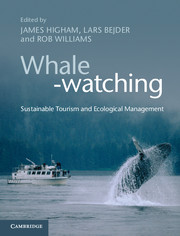Book contents
- Frontmatter
- Dedication
- Contents
- Acknowledgements
- List of contributors
- List of abbreviations
- 1 Tourism, cetaceans and sustainable development
- Part I The historical and contemporary contexts
- 2 Threats facing cetacean populations
- 3 From exploitation to adoration
- 4 Human attitudes and values
- 5 The whale-watching industry
- 6 The International Whaling Commission (IWC) and whale-watching
- Part II Human dimensions of whale-watching
- Part III Ecological dimensions of whale-watching
- Part IV Sustainable management: insights and issues
- Index
- Plate Section
- References
6 - The International Whaling Commission (IWC) and whale-watching
from Part I - The historical and contemporary contexts
Published online by Cambridge University Press: 05 April 2014
- Frontmatter
- Dedication
- Contents
- Acknowledgements
- List of contributors
- List of abbreviations
- 1 Tourism, cetaceans and sustainable development
- Part I The historical and contemporary contexts
- 2 Threats facing cetacean populations
- 3 From exploitation to adoration
- 4 Human attitudes and values
- 5 The whale-watching industry
- 6 The International Whaling Commission (IWC) and whale-watching
- Part II Human dimensions of whale-watching
- Part III Ecological dimensions of whale-watching
- Part IV Sustainable management: insights and issues
- Index
- Plate Section
- References
Summary
Introduction
The International Whaling Commission (IWC) is the global body charged with ensuring the conservation and management of whales. It performs a central role in the discussion of all aspects of whaling and, since 1975, whale-watching. In terms of whale-watching, the brief of the IWC extends to the scientific, legal, socioeconomic and educational aspects of the activity. A critical function of the IWC for more than three and a half decades has been to collate, analyse and disseminate leading edge research and information on whale-watching to member (and non-member) governments. It also provides a forum for the discussion and dissemination of scientific studies addressing all aspects of whale-watching in a timely manner. As such, the IWC contributes at the global level to the pursuit of sustainable whale-watching, while addressing the educational, socio-cultural and economic development opportunities that are widely associated with it.
This chapter provides a brief review of the activities and outcomes achieved by the IWC in the 37 years since whale-watching became incorporated into the IWC agenda. Central to this historical review is the critical role that the IWC has played in the transition from extractive to non-extractive practices. It also seeks to underline the role of the IWC in facilitating the development of sustainable whale-watching; a future in which education, research, conservation, and management are seamlessly engaged and mutually informing. This goal arises from the philosophy that commercial whale-watching and rigorous science can take place simultaneously, particularly with whale-watching vessels used as ‘platforms of opportunity’ to collect data. In addition, commercial whale-watching passengers can be actively engaged in the research and conservation efforts of the scientific community and management agencies, such that all stakeholders play an active part in learning about whale conservation and informing sustainable tourism management. Lastly, the chapter explores the case of Antarctic whale-watching, illustrating the interplay of commercial whale-watching, science and conservation.
- Type
- Chapter
- Information
- Whale-watchingSustainable Tourism and Ecological Management, pp. 71 - 78Publisher: Cambridge University PressPrint publication year: 2014



